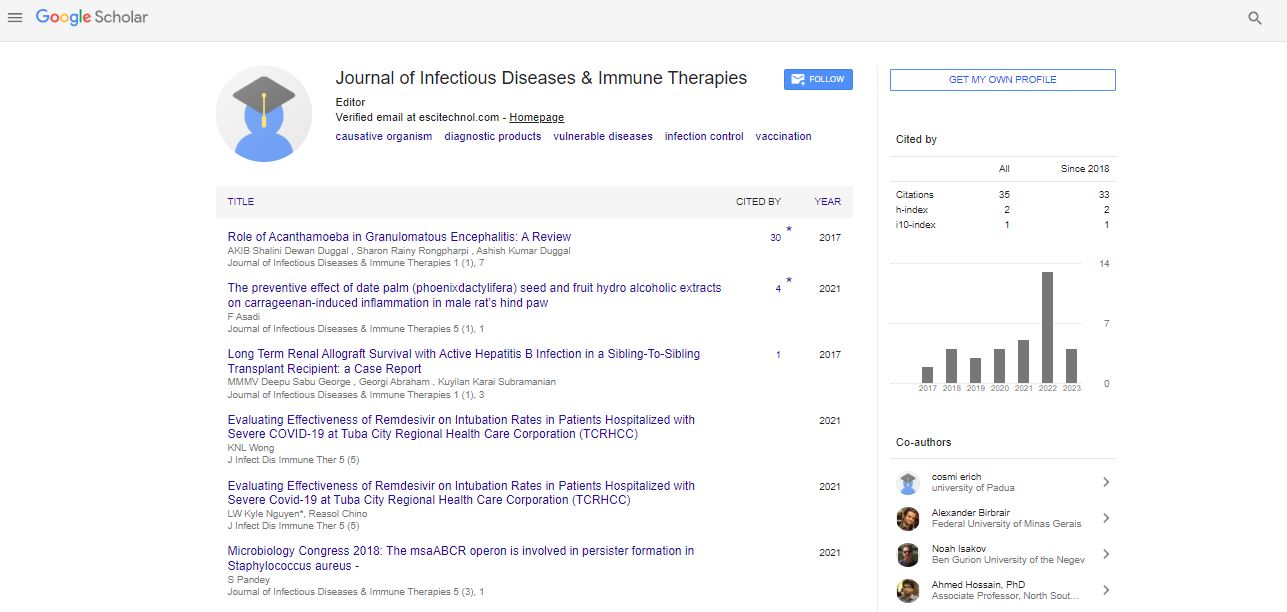Commentary, J Aging Geriatr Med Vol: 7 Issue: 3
A Global Perspective on Socioeconomic Impact and Ethical Considerations of Ebola Virus Disease Outbreaks
Hassarie Wina*
1Department of Infectious Diseases, University of Melbourne for Infection and Immunity, Melbourne, Australia
*Corresponding Author: Hassarie Wina,
Department of Infectious Diseases,
University of Melbourne for Infection and Immunity, Melbourne, Australia
E-mail: hassarie.wina@mh.org.au
Received date: 28 August, 2023, Manuscript No. JIDITH-23-117450;
Editor assigned date: 30 August, 2023, PreQC No. JIDITH-23-117450 (PQ);
Reviewed date: 13 September, 2023, QC No. JIDITH-23-117450;
Revised date: 21 September, 2023, Manuscript No. JIDITH-23-117450 (R);
Published date: 29 September, 2023, DOI: 10.4172/2329-9541.1000351
Citation: Wina H (2023) A Global Perspective on Socioeconomic Impact and Ethical Considerations of Ebola Virus Disease Outbreaks. J Infect Dis Immune Ther 7:3.
Description
The terrible effects of Ebola Virus Disease (EVD) epidemics have drawn the attention of the international community. The Ebola Virus Disease (EVD), which mostly causes epidemics in Central and West Africa, has been a persistent concern to public health worldwide. Although these outbreaks have so far only affected a small geographic area, their potential for global spread and possible effects on local populations call for a broad global viewpoint. The Ebola River, close to the community of Yambuku, where the first known outbreak took place, is where the word "Ebola" originates. The virus-based illness was subsequently given the label Ebola Virus Disease (EVD). The Zaire Ebola Virus (EBOV), Sudan ebola virus, Tai Forest ebolavirus, Bundibugyo Ebolavirus (BDBV), and Reston ebola virus are among the various Ebola virus species that have been identified over time. Global efforts were made in reaction to the West African epidemic by numerous nations, international organizations, and health professionals in order to control the outbreak and treat people who were harmed. The severity of the Ebola outbreak in West Africa hastened the development of an Ebola vaccine. The occasional but severe outbreaks of the Ebola virus throughout its history have increased public awareness of the illness and the value of international cooperation in combating infectious disease. Future outbreaks can be avoided and dealt with by continuing studies and attention to detail.
Ethical challenges
Participants in study may frequently come from underserved and vulnerable populations, who are disproportionately affected by EVD. It is of utmost importance to guarantee that these people are handled morally, receive appropriate treatment, and have access to potential benefits. Getting participants' informed consent can be difficult, especially in areas with poor literacy rates or where communities may be wary of outside interventions. Making sure everyone understands and wants to participate is vital. It is unethical to subject individuals to therapies that have not been demonstrated effective or safe by using experimental treatments in clinical studies. The complex ethical conundrum of balancing potential advantages and risks is well known.
Ethical challenges in clinical trials
Randomization is a key component of clinical trials but can raise concerns about fairness, especially when it involves withholding a potentially effective treatment from a control group. Ethical considerations are essential in determining the design and implementation of trials. Conducting clinical trials requires significant resources, including personnel, infrastructure, and funding. Distributing these resources equitably, especially when responding to outbreaks in resource-limited settings, is an ethical imperative. What happens after a clinical trial concludes is an important ethical concern. Ensuring access to any proven beneficial treatments for participants and affected communities is essential. Engaging with affected communities from the outset is vital. Investigators must understand community concerns, values, and needs. Transparent and respectful communication is essential. Independent ethics review boards play a pivotal role in ensuring the ethical conduct of study and trials. These boards should comprise experts who can assess the potential risks, benefits, and ethical considerations of each study. In the spirit of solidarity, international collaboration is essential for responsible study and clinical trials. Sharing data and knowledge is vital for addressing EVD, and ethical principles should extend to investigation partnerships. Ethical considerations encompass data sharing. Transparency in sharing investigation findings and clinical trial results is an ethical obligation, benefiting the global community. Ensuring equitable access to the benefits of investigation is vital. Post-trial access to effective treatments and interventions should be a priority, particularly in affected regions.
Conclusion
EVD outbreaks, although regionally concentrated, demand a global perspective due to their potential for international transmission and devastating consequences. By understanding the historical context, epidemiology, global preparedness, key challenges, and collaborative efforts, the global community can work together to mitigate the impact of future outbreaks and prevent the global spread of EVD. Ethical considerations are at the core of Ebola virus studies and clinical trials. As the global community grapples with this deadly pathogen, adherence to ethical principles is fundamental to responsible conduct. The vulnerability of participants, the uncertainty of experimental treatments, and the potential consequences for affected communities underscore the importance of robust ethical oversight.
 Spanish
Spanish  Chinese
Chinese  Russian
Russian  German
German  French
French  Japanese
Japanese  Portuguese
Portuguese  Hindi
Hindi 